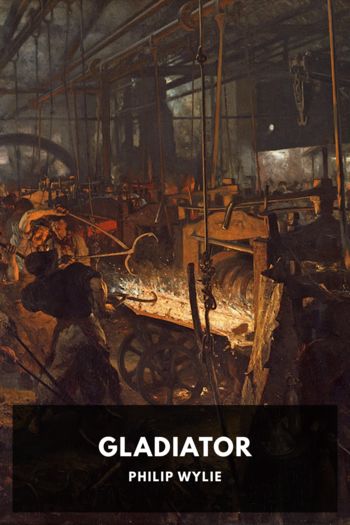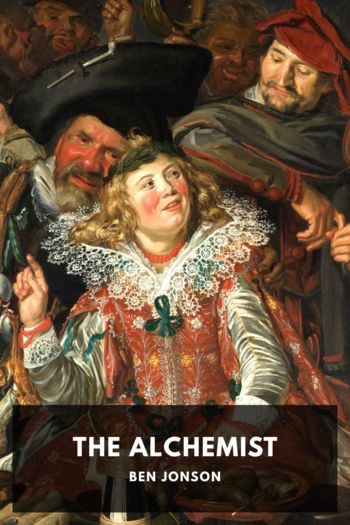Gladiator - Philip Wylie (classic novels for teens txt) 📗

- Author: Philip Wylie
- Performer: -
Book online «Gladiator - Philip Wylie (classic novels for teens txt) 📗». Author Philip Wylie
“Hello? Danner, my friend—”
“Oh, hello, Skorvsky—”
“May I come up? It is important.”
“Sure. I’m still in bed. But come on.”
Hugo was under the shower bath when his visitor arrived. He invited Skorvsky to share his breakfast, but was impatiently refused. “Things have happened since last night, Comrade Danner. For one, I saw the chief.”
“Chief?”
“You have not met him as yet. We conferred about your scheme. He—I regret to say—opposed it.”
Hugo nodded. “I’m not surprised. I’ll tell you what to do. You take me to him—and I’ll prove conclusively that it will be successful. Then, perhaps, he will agree to sanction it. Every time I think of those two poor devils—snatched from a mob—waiting there in the dark for the electric chair—it makes my blood boil.”
“Quite,” Skorvsky agreed. “But you do not understand. It is not that he doubts your ability—if you failed it would not be important. He fears you might accomplish it. I assured him you would. I have faith in you.”
“He’s afraid I would do it? That doesn’t make sense, Skorvsky?”
“It does, I regret to say.” His expressive face stirred with discomfort. “We were too hasty, too precipitate. I see his reason now. We cannot afford as a group to be branded as jail-breakers.”
“That’s weak,” Hugo said.
Skorvsky cleared his throat. “There are other matters. Since Davidoff and Pletzky were jailed, the party has grown by leaps and bounds. Money has poured in—”
“Ah,” Hugo said softly, “money.”
Skorvsky raged. “Go ahead. Be sarcastic. To free those men would cost us a million dollars, perhaps.”
“Too bad.”
“With a million—the million their electrocution will bring from the outraged—we can accomplish more than saving two paltry lives. We must be hard, we must think ahead.”
“In thinking ahead, Skorvsky, do you not think of the—closing of a switch and the burning of human flesh?”
“For every cause there must be martyrs. Their names will live eternally.”
“And they themselves—?”
“Bah! You are impractical.”
“Perhaps.” Hugo ate a slice of toast with outward calm. “I was hoping for a government that—did not weigh people against dollars—”
“Nor do we!”
“No?”
Skorvsky leaped to his feet. “Fool! Dreamer! Preposterous idealist! I must be going.”
Hugo sighed. “Suppose I went ahead?”
“One thing!” The Russian turned with a livid face. “One thing the chief bade me tell you. If those men escape—you die.”
“Oh,” Hugo said. He stared through the window. “And supposing I were to offer your chief a million—or nearly a million—for the privilege of freeing them?”
Skorvsky’s face returned to its look of transfiguration, the look that had accompanied his noblest words of the night before. “You would do that, comrade?” he whispered. “You would give us—give the cause—a million? Never since the days of our Savior has a man like you walked on this—”
Hugo stood up suddenly. “Get out of here!” His voice was a cosmic menace. “Get out of here, you dirty swine. Get out of here before I break you to matchwood, before I rip out your guts and stuff them back through your filthy, lying throat. Get out, oh, God, get out!”
HUGO realized at last that there was no place in his world for him. Tides and tempest, volcanoes and lightning, all other majestic vehemences of the universe had a purpose, but he had none. Either because he was all those forces unnaturally locked in the body of a man, or because he was a giant compelled to stoop and pander to live at all among his feeble fellows, his anachronism was complete.
That much he perceived calmly. His tragedy lay in the lie he had told to his father; great deeds were always imminent and none of them could be accomplished because they involved humanity, humanity protecting its diseases, its pettiness, its miserable convictions and conventions, with the essence of itself—life. Life not misty and fecund for the future, but life clawing at the dollar in the hour, the security of platitudes, the relief of visible facts, the hope in rationalization, the needs of skin, belly, and womb.
Beyond that, he could see destiny by interpreting his limited career. Through a sort of ontogenetic recapitulation he had survived his savage childhood, his barbaric youth, and the Greeces, Romes, Egypts, and Babylons of his early manhood, emerging into a present that was endowed with as much aspiration and engaged with the same futility as was his contemporary microcosm. No life span could observe anything but material progress, for so mean and inalterable is the gauge of man that his races topple before his soul expands, and the eventualities of his growth in space and time must remain a problem for thousands and tens of thousands of years.
Searching still further, he appreciated that no single man could force a change upon his unwilling fellows. At most he might inculcate an idea in a few and live to see its gradual spreading. Even then he could have no assurance of its contortions to the desire for wealth and power or of the consequences of those contortions.
Finally, to build, one must first destroy, and he questioned his right to select unaided the objects for destruction. He looked at the Capitol in Washington and pondered the effect of issuing an ultimatum and thereafter bringing down the great dome like Samson. He thought of the churches and their bewildering, stupefying effect on masses who were mulcted by their own fellows, equally bewildered, equally stupefied. Suppose through a thousand nights he ravaged the churches, wrecking every structure in the land, laying waste property, making the loud, unattended volume of worship an impossibility, taking away the purple-robed gods of his forebears? Suppose he sank the navy, annihilated the army, set up a despotism? No matter how efficiently and well he ruled, the millions would hate him, plot against him, attempt his life; and every essential agent would be a hypocritical sycophant seeking selfish ends.
He reached the last of his conclusions sitting beside a river whither he had walked to think. An immense loathing for the world rose up in him. At its apex a locomotive whistled in the distance, thundered inarticulately, and rounded a bend. It came very near the place where Hugo reclined, black, smoking, and noisy, drivers churning along the rails, a train of passenger cars behind. Hugo could see the dots that were people’s heads. People! Human beings! How he hated them! The train was very near. Suddenly all his muscles were unsprung. He threw himself to his feet and rushed toward the train, with a passionate desire to get his fingers around the sliding piston, to up-end the locomotive and to throw the ordered machinery into a blackened, blazing, bloody tangle of ruin.
His lips uttered a wild cry; he jumped across the river and ran two prodigious steps. Then he stopped. The train went on unharmed. Hugo shuddered.
If the world did not want him, he would leave the world. Perhaps he was a menace to it. Perhaps he should kill himself. But his burning, sickened heart refused once more to give up. Frenzy departed, then, numbness. In its place came a fresh hope, new determination. Hugo Danner would do his utmost until the end. Meanwhile, he would remove himself some distance from the civilization that had tortured him. He would go away and find a new dream.
The sound of the locomotive was dead in the distance. He crossed the river on a bridge and went back to his house. He felt strong again and glad—glad because he had won an obscure victory, glad because the farce of his quest in political government had ended with no tragic denouement.
They were electrocuting Davidoff and Pletzky that day The news scarcely interested Hugo. The part he had very nearly played in the affair seemed like the folly of a dimly remembered acquaintance. The relief of resigning that impossible purpose overwhelmed him. He dismissed his servants, closed his house, and boarded a train. When the locomotive pounded through the station, he suffered a momentary pang. He sat in a seat with people all around him. He was tranquil and almost content.
HUGO had no friends. One single individual whom he loved, whom he could have taken fully into his confidence, might, in a measure, have resolved his whole life. Yet so intense was the pressure that had conditioned him that he invariably retreated before the rare opportunities for such confidences. He had known many persons well: his father and mother, Anna Blake, Lefty Foresman, Charlotte, Iris, Tom Shayne, Roseanne, even Skorvsky—but none of them had known him. His friendliness was responsible for a melancholy yearning to remain with his kind. Having already determined to go away, he sought for a kind of compromise.
He did not want to be in New York, or Washington, or any other city; the landscape of America was haunted for him. He would leave it, but he would not open himself to the cruel longing for his own language, the sight of familiar customs and manners. From his hotel in New York he made excursions to various steamship agencies and travel bureaus. He had seen many lands, and his Wanderlust demanded novelty. For days he was undecided.
It was a chance group of photographs in a Sunday newspaper that excited his first real interest. One of the pictures was of a man—erect, white-haired, tanned, clear-eyed-Professor Daniel Hardin—a procession of letters—head of the new expedition to Yucatan. The other pictures were ruined temples, unpiled stone causeways, jungle. He thought instantly that he would like to attach himself to the party.
Many factors combined to make the withdrawal offered by an expedition ideal. The more Hugo thought about it, the more excited he became. The very nascency of a fresh objective was accompanied by and crowded with new hints for himself and his problems.. The expedition would take him away from his tribulations, and it would not entirely cut him off from his kind: Professor Hardin had both the face and the fame of a distinguished man.
A thought that had been in the archives of his mind for many months came sharply into relief: of all human beings alive, the scientists were the only ones who retained imagination, ideals, and a sincere interest in the larger world. It was to them he should give his allegiance, not to the statesmen not to industry or commerce or war. Hugo felt that in one quick glimpse he had made a long step forward.
Another concept, far more fantastic and in a way even more intriguing, dawned in his mind as he read accounts of the Maya ruins which were to be excavated. The world was cluttered with these great lumps of incredible architecture. Walls had been builded by primitive man, temples, hanging gardens, obelisks, pyramids, palaces, bridges, terraces, roads—all of them gigantic and all of them defying the penetration of archaeology to find the manner of their creation. Was it not possible—Hugo’s heart skipped a beat when it occurred to him—that in their strange combination of ignorance and brilliance the ancients had stumbled upon the secret of human strength—his secret! Had not those antique and migratory peoples carried with them the formula which could be poured into the veins of slaves, making them stronger than engines? And was it not conceivable that, as their civilizations crumbled, the secret was lost, together with so many other formula of knowledge?
He could imagine plumed and painted priests with prayer and sacrifice cutting open the veins of prehistoric mothers and pouring in the magic potion. When the babies grew, they could





Comments (0)